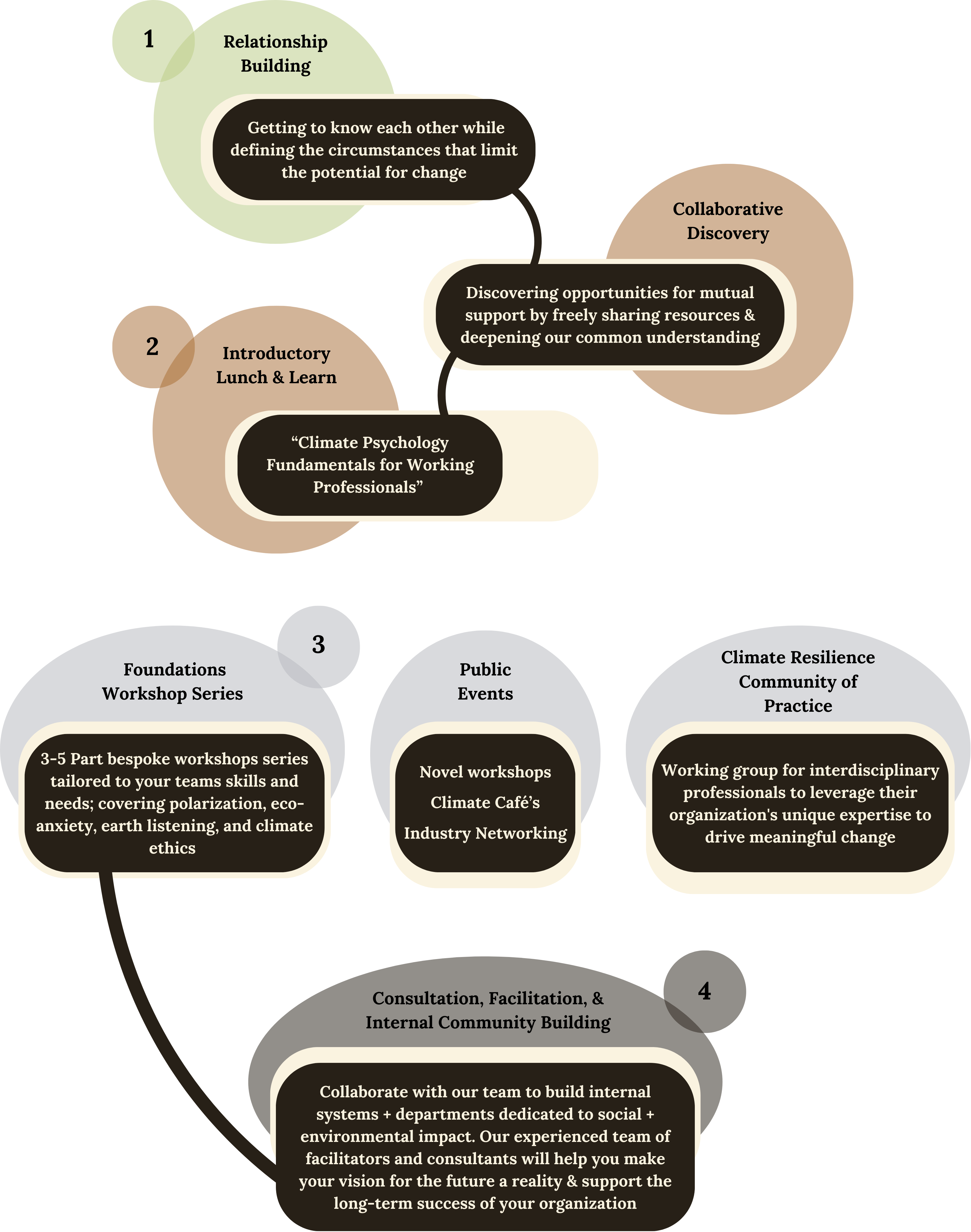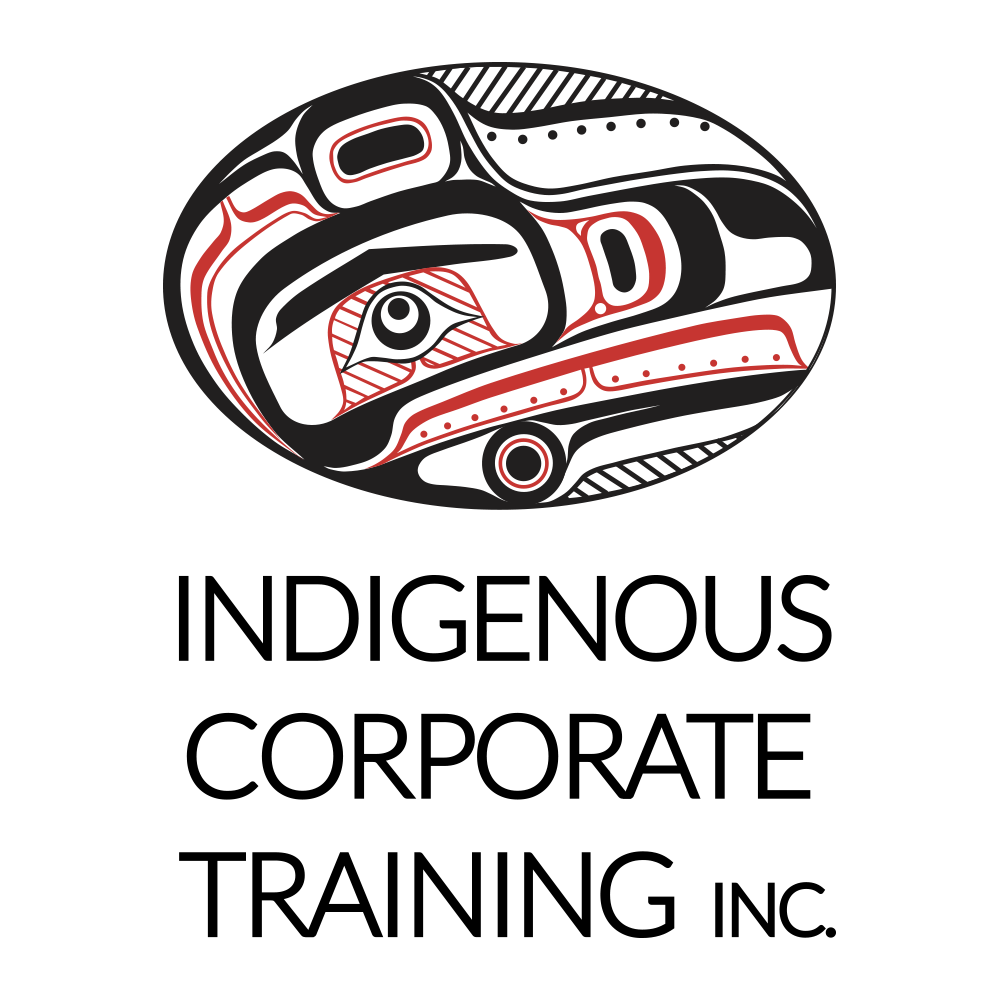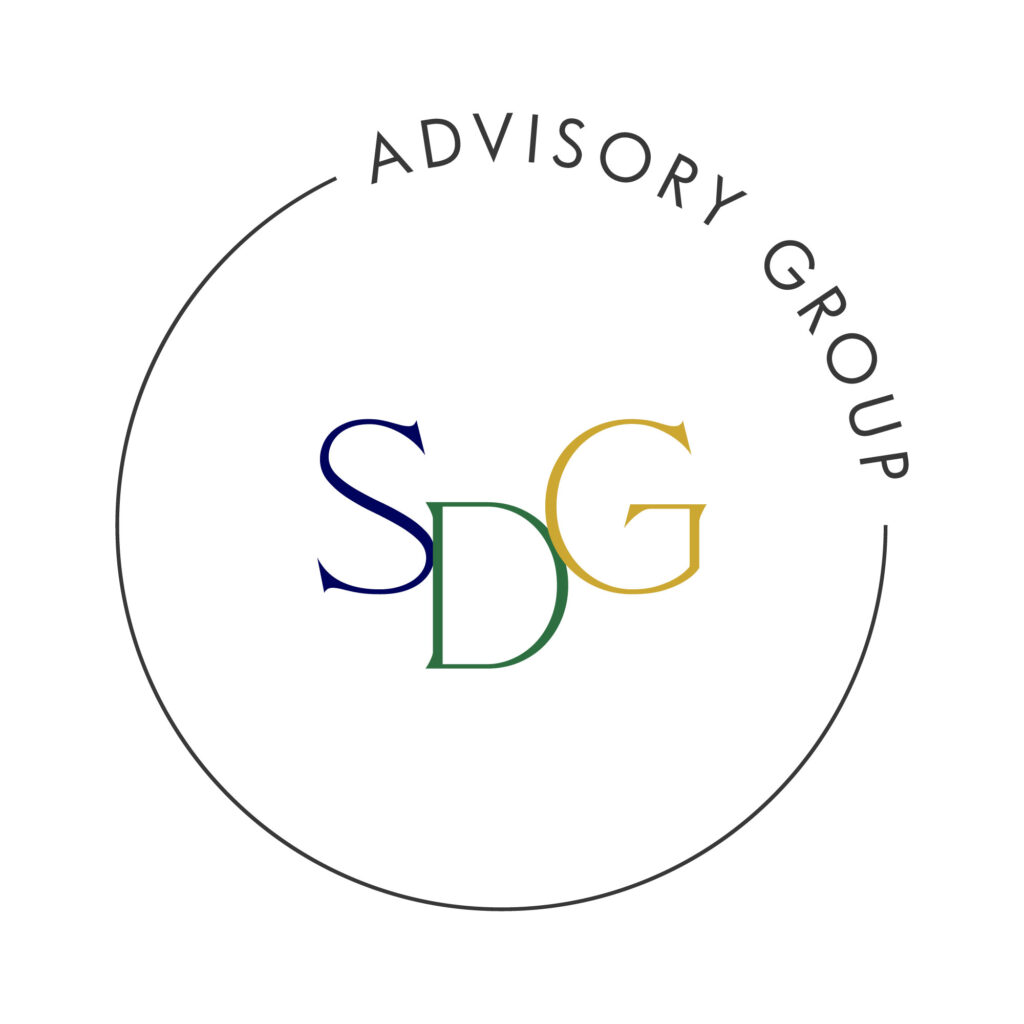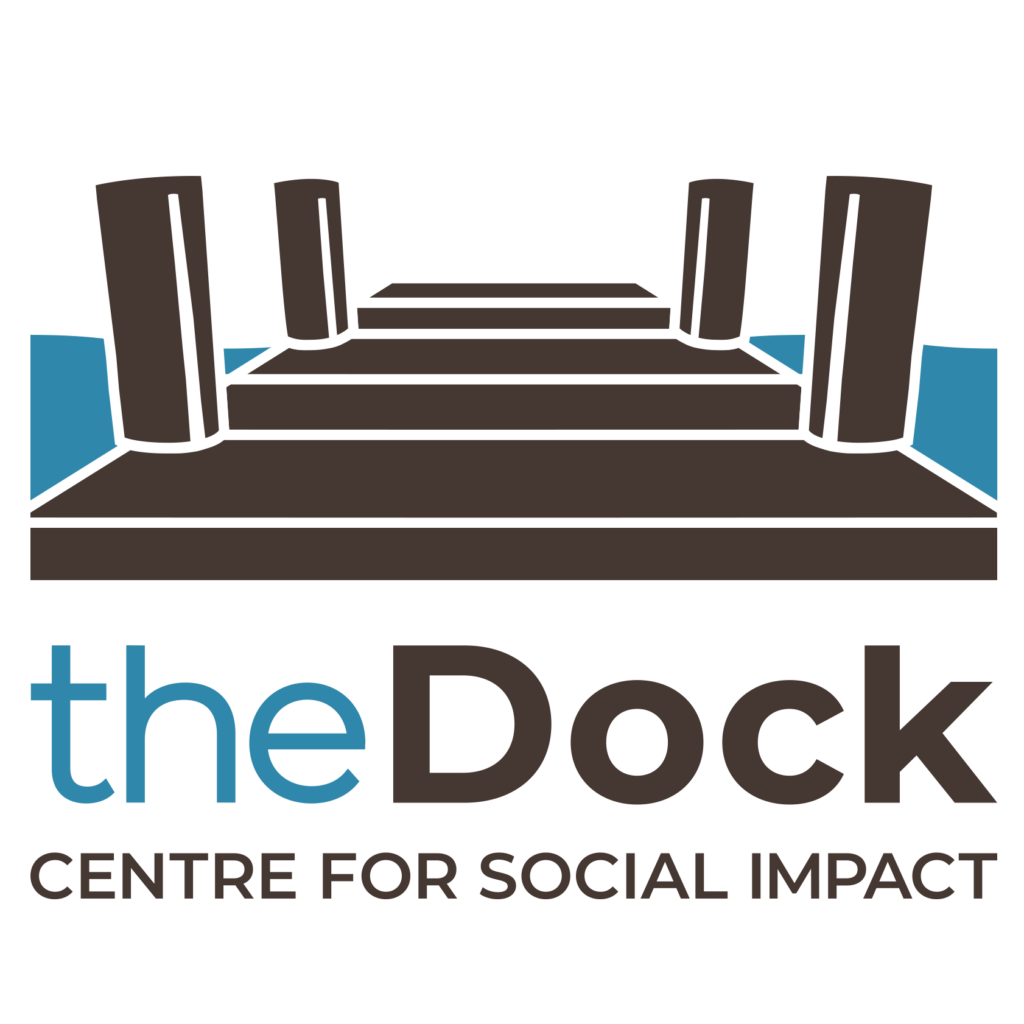Services
Four Part
Flow
- Relationship building - Meet for coffee, learn about each others work, and share the dilemmas limiting your organization's ability to drive meaningful social / environmental change.
- Collaborative Discovery - Discover ways that our team can support your goals and initiatives without economic exchange; inclusive of our introductory lunch and learn on the Fundamentals of Climate Psychology.
- Workshops, Public Events & Community of Practice - Engage your organization in our foundations workshop series or invite your team to engage in our Public Workshops or Climate Resilience Community of Practice.
- Consultation and Internal Systems Development - We offer a wide range of consulting and facilitation services to support your organization's continued success in a complex global future.
Four Part
Flow
- Relationship building - Meet for coffee, learn about each others work, and share the dilemmas limiting your organization's ability to drive meaningful social / environmental change.
- Collaborative Discovery - Discover ways that our team can support your goals and initiatives without economic exchange; inclusive of our introductory lunch and learn on the Fundamentals of Climate Psychology.
- Workshops, Public Events & Community of Practice - Engage your organization in our foundations workshop series or invite your team to engage in our Public Workshops or Climate Resilience Community of Practice.
- Consultation and Internal Systems Development - We offer a wide range of consulting and facilitation services to support your organization's continued success in a complex global future.

Climate Psychology Fundamentals for Working Professionals
Online Lunch-and-Learn
- Correlating climate psychology to business success (why this matters): Understanding how climate psychology is critically important to sustaining your business success a complex and uncertain world.
- Foundational principles of climate psychology: Self-care as activism, managing climate anxiety, diffusing apathy and paralysis related to existential predicaments, radical transformative hope
- The parallels between climate denial and radical activism: Learn how fear drives a rainbow of responses to existential issues like climate change
- Critical soft skills for Social Change: Learn techniques for holding constructive conversations on polarizing topics such as climate change
- The importance of language: Understand how the concept of Anthropocentrism, Climate Resilience, and the Polycrisis play an important role in change
- Eco-gestures: Investigate simple techniques for embedding care for the environment and society into day-to-day actions
Foundations Workshop Series
Empower your team towards alternative ways of thinking about sustainability and corporate social responsibility. This foundational series of 3 workshops prepares your team to think adaptively and find new inspiration to address the worlds most complex issues.
Managing Polarization: Turning differing Opinions Into Better Design
Develop foundational skills to engage in constructive, compassionate dialogue with those holding differing viewpoints
Learn MoreBeyond Carbon Neutral: The Blind Spots in Corporate Sustainability Initiatives
Expand your view on the 'climate crisis' by discovering novel ways for your organization to give back to society and the earth
Learn MoreNavigating Uncertainty: Future-proofing your Organization
Engaging in a creative thinking to conceptualize how your organization should adapt to potential climate futures
Learn MoreBespoke Workshops
Climate Paradigm Collaborative has a broad portfolio of workshops that can be tailored to meet your team's specific needs
Our facilitation focuses on bringing the wisdom that already exists in your organization to life. We are continuously finding new ways of conveying knowledge by co-developing workshops, tools, and activities with our clients. Co-development allows our team to meet you where you are at, finding unique intersections between your industry expertise and our outside perspective. When building and facilitating workshops we always prioritize:
- Inderdisciplinary collaboration (outside-the-box thinking)
- Participant led discussion and ideation
- Discovering day-to-day applications of content
- Slowing down and engaging at a pace that is right for you

Consulting Services
Modernize your existing sustainability systems and become an industry leader in environmental regeneration & social change. These systems don't exist? Hire us to act as your in-house sustainability department.
Climate Paradigm Collaborative offers embedded consulting services for organizations seeking to develop significant climate initiatives or bolster their internal standards and processes related to climate change, sustainability, and environmental ethics. We work with organization either remotely or in person to:
- Co-develop regenerative systems, standards, and development tools relevant to your industry.
- Provide accountability for maintaining knowledge gained through our workshops.
- Assess how your organization is positioned for success in a clouded global future.
Collaborators
We work a range of interdisciplinary organizations to help you access a holistic approach to change
Decolonization | Indigenous Relations | Ethical Finance | Waste Reduction | Lifecycle Cost Analysis | Scope 3 Emissions Consulting | Eco-Therapy
Personal Climate Coaching
Personal 1 on 1 coaching is also available through network of facilitators and consultants. These sessions can help you maximize your personal impact on the climate crisis by either give you tools to empower others others, or empowering you directly to take your own climate action in your personal or professional life. Our team can also help manage feelings of climate-stress / eco-anxiety / despair that are frequently associated with the severity and complexity of the climate crisis (polycrisis) and the degree of control we have as individuals. Flexible pricing is available based on income and need.

Workshop Catalogue

- Managing Polarization for Complex Topics
- Polycrisis / Climate Crisis Fundamentals
- Climate Narratives & Embodied Strength
- Science Fiction and Corporate Adaptation
- Climate Coaching Techniques
- Hope, Resilience, and Self Care
- Earth Listening as a Design Principle
- Engineering Micro Decisions
- Climate Metrics – Beyond Sustainability
- Climate Ethics for Engineers
Managing Polarization for Complex Topics
Overview
This workshop is fundamental to Climate Paradigm’s overall process and mission. Polarization related to divisive / contentious topics such as politics, social equity, and climate change is a fundamental hindrance to solving these issues. To address this challenge, workshop participants will develop skills to engage in constructive, compassionate dialogue with those holding differing viewpoints. This workshop provides tools and techniques for managing these polarized conversations with empathy and curiosity.
Workshop Aim
Practice using interpersonal tools to resolve conflicts and engage in constructive discussions about complex topics in the workplace.
Explore paradoxical questions, such as “What should be done about climate change?” and “Is it my responsibility to do something about it?”
Cultivate compassion and curiosity in place of fear, anger, and judgment.
Participant Profile – General / All
Level of Emotional Depth – Moderate
The workshop delves into complex emotions such as anger, fear, and compassion and encourages participants to engage with uncomfortable opinion.
Duration – 2 hours
Group Size
Ideal: 8
Maximum: 12 to 20 with co-facilitation.
Climate Crisis (Polycrisis) Fundamentals
Overview
This workshop is fundamental to Climate Paradigm’s overall process and mission. To maximizes meaningful social impact, we must first hold a baseline understanding of what the climate crisis currently entails. This workshop will provide an overview of modern climate terminology, an index of tipping points, climate initiatives relevant to your organization, reasons to have hope, and common myths / fallacies which stifle positive change.
Workshop Aim
Create a uniform understanding of the climate crisis (polycrisis) which allows room for a diverse array of opinions and perspectives to co-exist in harmony.
Clarify the significance of our global net-zero targets, summarize what our trajectory is, and identify the limitations of this framework.
Foster a sense of urgency and hope in the face of the climate crisis (polycrisis)
Equip participants with methods to manage eco-anxiety when engaging with emotionally challenging content.
Participant Profile – General / All
Level of Emotional Depth – Moderate
This workshop covers content that can be challenging to be with and has the potential to evoke strong emotions, such as eco-grief, particularly for those already burdened by environmental concerns.
Duration – 1.5 hours
Group Size
Ideal: 12
Maximum: 20
Climate Narratives & Embodied Strength
Overview
It is rare for us to take pause in the corporate world and use story to identify interpersonal commonalities and strengths. This workshop encourages participants to share their personal climate narratives—stories of how they have come to understand the climate crisis and their connection to nature. By expressing these narratives, participants will discover collective strengths and develop a shared sense of purpose and capability to drive meaningful change.
Workshop Aim
Enhance acceptance and connection among participants through sharing climate narratives.
Identify collective team strengths and capabilities that make your team uniquely positioned to address climate and social issues.
Identify soft areas where we may be personally lacking or capable of teaching, mentoring, and supporting each other in growth.
Participant Profile – General / All – Ideally a cohesive close-working team.
Level of Emotional Depth – Light
Focuses on sharing stories and building collective strength, expanding tolerance for discussing challenging topics like climate change.
Duration – 1.5 – 2.5 hours (depending on number of participants)
Group Size
Ideal: 6
Maximum: 12
Science Fiction and Corporate Adaptation
Overview
Leveraging creative writing and our artistic capacity is a potent but under-utilized technical development tool. This workshop adopts techniques from science fiction and place writing as a mechanism for breaking conventional thinking and inspiring innovative solutions. Participants will conceptualizing dystopian futures and explore how their organization might adapt (or help humanity adapt) to this world in a way that allows humanity and the interconnected web of life to thrive.
Workshop Aim
Learn to use creative writing techniques to inform technical and economic decision making within a corporate environment.
Develop of a list of backlog projects and eco-gestures which can serve to future-proof your organization or bolster your meaningful social impact.
Develop a list of ways in which your organization can leverage it’s talent, position, and industrial knowledge to help humanity adapt to climate change both today and long into the future.
Participant Profile – Operational staff and leadership of any organization.
Level of Emotional Depth – Light / moderate
Engages creative thinking with some emotional exploration.
Duration – 2 hours
Group Size
Ideal: 12
Maximum: 20 (with co-facilitation)
Climate Coaching Techniques
Overview
Skills from the field of climate coaching (the art of empowering and equipping others to maximize their positive impact on existential issues like climate change) are directly applicable to skilled leadership and management. This workshop covers the fundamentals of climate coaching and highlights select concepts that are ideal for generating empowerment within a team. During the workshop, participants will be given opportunity to practice with these new techniques.
Workshop Aim
Equip participants with modern coaching tools which can be used to empower their peers, teams, and personal connections towards actions supporting positive social change.
Practice with coaching tools such as acceptance, trust, compassion, curiousity, active listening, presence, and pace.
Equip participants with methods for addressing common economic dilemmas a philosophical fallacies related to the climate crisis (polycrisis).
Participant Profile – Management and Leadership of any organization
Level of Emotional Depth – Light
Focuses on practical coaching skills with less emotional intensity.
Duration – 1.5 – 2 hours depending on number of participants
Group Size
Ideal: 4 – 6
Maximum: 12 (with co-facilitation)
Hope, Resilience, and Self Care
Overview
Burnout, a diluted sense purpose, and climate anxiety are increasingly impacting our work and interpersonal relationships. This workshop will equip participants with core concepts from the field of climate psychology including radical transformative hope, resilience, self-care as activism, and community-care. Participants will leave better equipped to manage their own climate-anxiety and support their peers ultimately leading to a more productive workforce.
Workshop Aim
Foster a sense of empowerment and grounded optimism related to climate change.
Develop tools to care for each other in a complex, uncertain, and financially pressured world.
Increase our capacity to be with challenging emotions related to the climate crisis, systemic inequity, and the ongoing effects of colonization.
Participant Profile – General / All
Level of Emotional Depth – Moderate
The workshop covers self-care and mental resilience, which may touch on societal pain and personal grief.
Duration – 1.5 hours (depending on number of participants)
Group Size
Ideal: 12
Maximum: 20 (with co-facilitation)
Earth Listening as a Design Principle
Overview
Great thinkers throughout recorded history have allowed nature and natural processes to inform their work, design, and thought. It is only in modern times that we have fallen away from this process of listening in favor of anthropocentric world views. Participants will learn techniques for integrating the practice of “earth listening” into their work, reconnecting with the natural world and bolstering their familiar rational decision making process’.
Workshop Aim
Provide participants with accessible methods for engaging in the practice of earth listening practice
Increase understanding of how to incorporate nature’s voice into decision-making
Increase our capacity to be with challenging emotions related to the climate crisis.
Bring awareness to tools and resources for deepening the practice of earth listening.
Participant Profile – General / All – Participation should be optional for those uncomfortable with esoteric concepts.
Level of Emotional Depth – High
This workshop has the potential to open participant’s hearts to a wide range of challenging emotions depending on a persons history and life circumstance.
Duration – 1.5 hours (Extended 4 hour weekend session available)
Group Size
Ideal: 8
Maximum: 12-20 (with co-facilitation)
Extended Session Maximum: 8
Engineering Micro-decisions
Overview
Engineers face an ever-increasing number of complex decisions where economics, social impact, and environmental considerations clash. The answers to these dilemmic decisions are often grey and time consuming to answer unless properly equipped. This workshop explores the process of making these micro-decisions and integrating environmental considerations into everyday engineering practices.
Workshop Aim
Articulate the common ethical dilemma of balancing economics, social well-being, and environmental impact when making technical decisions.
Generate a sense of empowerment by embedding eco-gestures and a deepened understanding of environmental ethics into daily actions.
Cultivate a culture of environmental accountability and a process of decision making which prioritizes regenerative systems within your team.
Participant Profile – General / All – Specifically tailored to engineering professionals.
Level of Emotional Depth – Light
Focuses on creating levity within decision making processes
Duration – 1.5 – 2 hours
Group Size
Ideal: 8
Maximum: 12-20 (with co-facilitation)
Climate Metrics – Beyond Sustainability
Overview
Traditionally, carbon emissions have been used as the primary and unified method for measuring climate impact. While carbon emissions are a useful and critical measuring tool, they miss some of the complexities of the climate crisis. Many technical professionals do not have the time or academic background to confidently identify alternative metrics to measure environmental / social impact. This workshop will teach participants methods for going beyond traditional sustainability metrics to create a deeper sense of purpose in their work and measure of their project success.
Workshop Aim
Educate on the limitations of carbon emissions as a sole metric.
Develop methods for creating alternative socio-environmental impact metrics.
Strengthen your team’s sense of purpose and autonomy in addressing the climate crisis (polycrisis).
Participant Profile – General / All – Specifically tailored to engineering professionals.
Level of Emotional Depth – Light
Focuses on metrics and purpose without delving deeply into emotional aspects.
Duration – 1.5 – 2 hours
Group Size
Ideal: 8
Maximum: 12-20 (with co-facilitation)
Climate Ethics for Engineers
Overview
The EGBC Code of Ethics states that engineers must:
“Hold paramount the safety, health, and welfare of the public, including the protection of the environment and the promotion of health and safety in the workplace.”
This statement implicitly includes an ethical duty for engineers to understand and respond to the climate crisis (polycrisis). This workshop explores this ethical responsibility and discusses the nuanced process of balancing economic pressures with long-term environmental and societal impacts. It provides practical insights into integrating environmental ethics into everyday professional practices.
Workshop Aim
Helps engineers to answer the question: “Where are the ethical lines between protecting the environment and well-being of future generations vs. working within the harsh economic realities of today and uncertain climate futures of tomorrow”?
Develop a nuanced understanding of corporate responsibility which considers a more intense sense of environmental ethics.
Use insights to reshape / embed company mission, vision, into daily practices.
Participant Profile – General / All – Specifically tailored to engineering professionals.
Level of Emotional Depth – Light / Moderate
Engages with ethical considerations and their impact on professional practice.
Duration – 1.5 hours
Group Size
Ideal: 8
Maximum: 12-20 (with co-facilitation)





